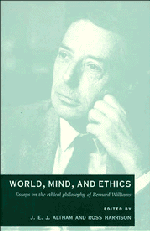Book contents
- Frontmatter
- Contents
- Notes on editors and contributors
- Introduction
- 1 The idea of equality revisited
- 2 Is the idea of purely internal consistency of choice bizarre?
- 3 Science, ethics, and objectivity
- 4 Fallibilism and objectivity: science and ethics
- 5 Might there be external reasons?
- 6 Aristotle on human nature and the foundations of ethics
- 7 A most peculiar institution
- 8 Reflection and confidence
- 9 The shape of a life
- 10 Replies
- Index
4 - Fallibilism and objectivity: science and ethics
Published online by Cambridge University Press: 05 August 2012
- Frontmatter
- Contents
- Notes on editors and contributors
- Introduction
- 1 The idea of equality revisited
- 2 Is the idea of purely internal consistency of choice bizarre?
- 3 Science, ethics, and objectivity
- 4 Fallibilism and objectivity: science and ethics
- 5 Might there be external reasons?
- 6 Aristotle on human nature and the foundations of ethics
- 7 A most peculiar institution
- 8 Reflection and confidence
- 9 The shape of a life
- 10 Replies
- Index
Summary
INTRODUCTION
Debates about whether evaluative claims (particularly ethical ones) meet standards of objectivity set by such paradigms as scientific theory and ordinary empirical statements used often to dwell upon the supposed fact that irresoluble disagreement was endemic in ethical discussion, but rare in scientific debate. In so doing, they exploited the observation that we take it to be one of the marks of a statement having an objective truth value that an unforced consensus can be secured concerning which truth value it has. It is now generally recognized that formulating the question in this way distorts the position in both science and ethics. It seems to be at best a hope that apparently irresoluble differences over scientific theory will be resolved by rational means. And consensus over ethical matters is more extensive than such debates admitted: although the plurality of values may produce irresoluble differences over what is to be done in particular circumstances, dissension is rarer over whether an act is cruel or kind, or a person vindictive or generous.
In chapter 8 of Ethics and the Limits of Philosophy, ‘Knowledge, Science, Convergence’, Bernard Williams argues that it is still possible to employ the notion of convergence of opinion to mark a fundamental difference between ethical beliefs and the products of scientific inquiry. The difference he discusses does not concern whether such convergence will be achieved; scientific research and ethical reflection both hope to arrive at opinions which will be endorsed by the independent findings of other people.
- Type
- Chapter
- Information
- World, Mind, and EthicsEssays on the Ethical Philosophy of Bernard Williams, pp. 46 - 67Publisher: Cambridge University PressPrint publication year: 1995
- 1
- Cited by



